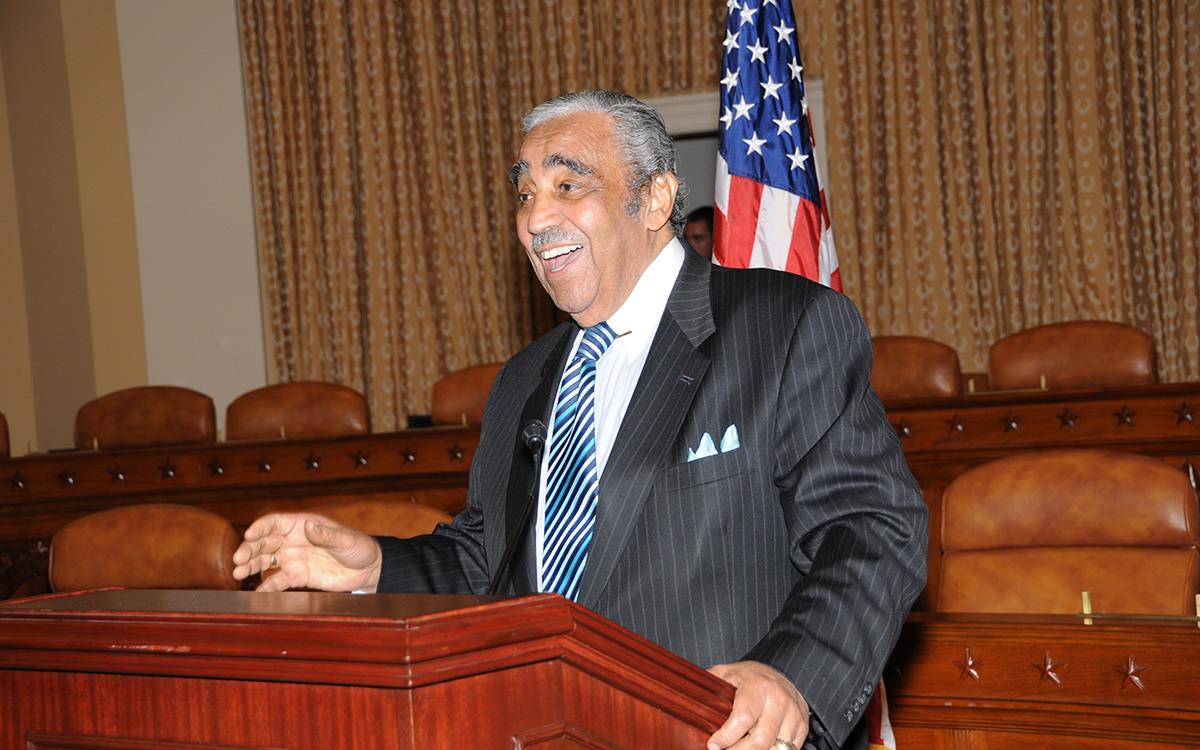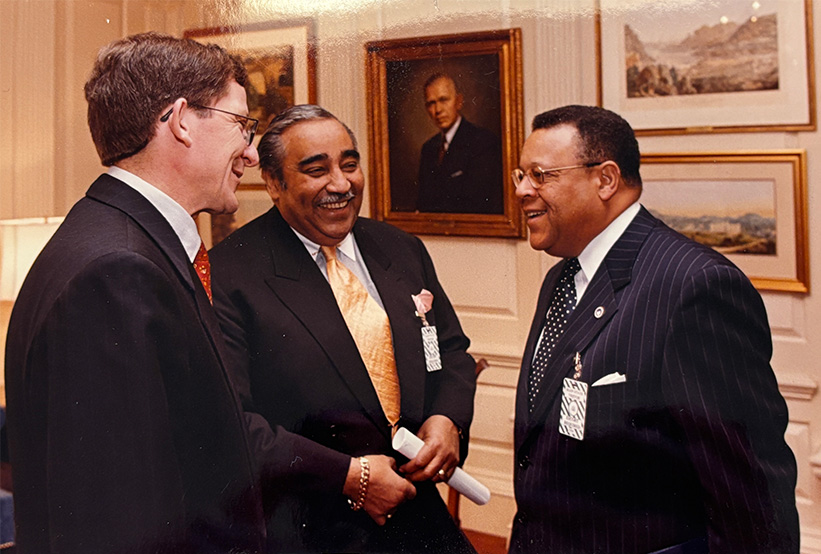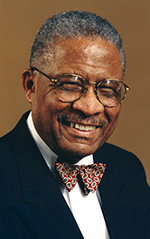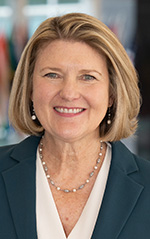Charles B. Rangel, 1930-2025: Supporting a Stronger Foreign Service
BY HORACE G. DAWSON AND PATRICIA SCROGGS

Congressman Rangel speaks with Rangel Fellows and Scholars during a July 8, 2008, ceremony he hosted on Capitol Hill to celebrate the first five years of the State Department program. Secretary of State Condoleezza Rice, former Secretary Colin Powell, and many members of Congress attended.
Courtesy of Patricia Scroggs
There was no missing Charlie Rangel when he walked into a room. With a booming voice, a huge smile, and radiant energy, he immediately grabbed your attention. He often began his remarks with the story of an experience that defined his life. On Nov. 30, 1950, he was a 20-year-old U.S. soldier on the border between Korea and China. Chinese troops launched a surprise attack, seriously wounding him and causing 90 percent casualties within his outfit. As he lay on the ground, he vowed that if he survived, he would live a life of purpose and gratitude.
This vow spurred a lifetime of distinguished service to his country. It also helps explain the joy and energy that characterized his approach to leadership and life. Among his many accomplishments, he worked to advance U.S. foreign policy and to strengthen the Foreign Service itself by encouraging expanded recruitment and training of Americans from across the nation.
Charles B. Rangel passed away on May 26, 2025, at age 94, leaving a remarkable legacy of public service. On June 13, 2025, St. Patrick’s Cathedral in New York City was filled with political leaders, dignitaries, and community members, all gathered to pay their final respects to a man who rose from humble beginnings to become a towering figure in American politics. His contributions were extraordinary. He was a decorated war veteran, 23-term representative of Harlem in the U.S. House of Representatives, chairman of the powerful Ways and Means Committee, co-founder of the Congressional Black Caucus, and dean of the New York delegation.
In the sphere of foreign policy, Congressman Rangel helped put one of the final nails in the coffin of apartheid in South Africa by passing the Rangel Amendment, legislation to deny foreign tax credits to U.S. corporations doing business in that country during apartheid. To deepen U.S. ties to Africa, he championed the African Growth and Opportunity Act, the cornerstone of U.S. economic engagement with one of the world’s fastest growing regions. He deepened U.S. business ties with our neighbors through promoting the Caribbean Basin Initiative, and he used his legislative prowess to support the Haitian people following numerous crises.
Through his work on foreign policy issues, Congressman Rangel developed a deep appreciation for the role of diplomacy in solving problems and respect for the professionalism of the Foreign Service. This led to one of his signature contributions: working with the State Department to create programs to strengthen the Foreign Service by enhancing recruitment and training of talented Americans from across the nation.

Congressman Rangel (center) discusses ways to enhance recruitment to strengthen the Foreign Service with Ambassador Marc Grossman (left) and Howard University President H. Patrick Swygert in Washington, D.C., 2001.
Courtesy of Howard University
Horace Dawson got to know Charlie Rangel when the congressman visited embassies where Dawson was posted in Africa and the Philippines. Rangel was deeply interested in the work that the Foreign Service was doing to advance U.S. interests and took note of the positive impact of Dawson’s background and experiences in making progress on U.S. priorities.
Representative Rangel believed the Foreign Service would benefit from the contributions of a wider range of Americans with different perspectives and experiences. Working his way up from the streets of Harlem, Congressman Rangel knew the perseverance, resourcefulness, and resilience that Americans rising from modest beginnings could bring to the mission of representing our nation. He valued unique American stories and strengths and wanted them to be part of our engagement with the world. He was fascinated by the work and life of Foreign Service officers and wanted young Americans to have the opportunity to experience the transformational life of being a diplomat.
Crediting the GI Bill for his own success, Congressman Rangel advocated for resources to recruit and train highly talented individuals, many of whom had no knowledge of Foreign Service careers and did not have the means to pursue the educational, internship, and travel opportunities that often characterize successful candidates. He worked with like-minded supporters in the State Department, U.S. Congress, and academia and engaged with Secretaries of State Madeleine Albright and Colin Powell to create a new merit-based Department of State program with both undergraduate scholar and graduate fellow components to attract outstanding individuals from across the nation. The State Department later named this program in his honor: the Charles B. Rangel International Affairs Program.
The decision to base this fellowship at Howard University, where Amb. Dawson worked as the director of the new Ralph J. Bunche International Affairs Center, allowed the two men to continue working closely on this initiative.
Patricia Scroggs’ engagement with Congressman Rangel began in January 2006, when she assumed leadership of the Rangel International Affairs Program at Howard University. Congressman Rangel was an energetic mentor and advocate for the program and for the Foreign Service. No matter how busy he was, he always made time to hold in-depth conversations with groups of Rangel graduate fellows and undergraduate scholars. With his signature energy and enthusiasm, he inspired them to believe in themselves and to put in the hard work needed to succeed. He always highlighted the crucial role that his wife and family played in his journey.
A strong supporter of closer ties between State Department and the U.S. Congress, Rangel was proud of the unique congressional internship component of the Rangel Program that prepared future members of the Foreign Service with an understanding of Congress’ role in foreign policy. He reached out to his congressional colleagues on both sides of the aisle to encourage them to host fellows for summer internships.
Having worked with the State Department to create a program with strong bipartisan support, Congressman Rangel engaged with successive Secretaries of State to further strengthen the Foreign Service. He extended his support to other merit-based Foreign Service fellowships, including the Thomas R. Pickering Foreign Affairs Fellowship Program and the USAID Donald M. Payne International Development Graduate Fellowship Program.
We mourn the loss of Congressman Rangel but know he leaves to the Foreign Service community a legacy of effective advocacy and close collaboration with successive administrations to advance U.S. foreign policy. He left a deep imprint on the Foreign Service by advocating for highly successful programs to recruit and train Americans from all regions and backgrounds. Rangel Fellow and Scholar participants and alumni, as well as the many other FSOs he supported, are his living legacy. Every day, all around the world, they take up his mantle of service to our nation.
When sharing or linking to FSJ articles online, which we welcome and encourage, please be sure to cite the magazine (The Foreign Service Journal) and the month and year of publication. Please check the permissions page for further details.




